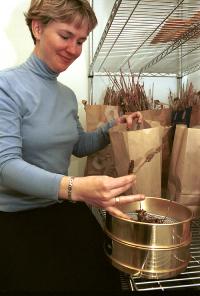March 13, 2003
New seed vault protects at-risk plants
A Noah’s ark of sorts, meant to protect seeds of rare and endangered native plants in Washington, has just been launched at the UW Center for Urban Horticulture.
The two-room vault, paid for by the Seattle-based Miller Charitable Trust, has walls, floor and ceiling able to withstand fire for four hours. The Center for Urban Horticulture is one of only three places in the United States and Canada with vaults providing such protection, say Sarah Reichard, assistant professor of forest resources, and Laura Zybas, program manager for Rare Care, a plant conservation effort based at the UW.
Seeds from at-risk plants are collected and stored in freezers so that if a population dies, there will still be seed available to try to re-establish it in the wild at some point.
Seeds are collected in ways meant to leave the native population unaffected, following protocols set by the national Center for Plant Conservation headquartered in St. Louis, Mo.
Collecting and storing seed is just part of the mission of UW’s Rare Care. Urban Horticulture students, faculty and a network of 84 volunteers across Washington state also monitor sites where endangered plants are growing and propagate cuttings and seedlings to boost populations where they are found in the wild.
In the past, Urban Horticulture has sent seeds of more than 50 of Washington’s estimated 460 threatened plants to be frozen and kept in vaults operated at a national facility in Fort Collins, Colo., and the Berry Botanic Garden in Portland.
In addition to fire protection, the new Miller Seed Vault has a work area and short-term storage kept at 60 degrees and low — about 20 percent relative — humidity, something not all the other facilities offer.
At those facilities the time-consuming process of separating, counting, weighing and labeling seeds often has to be done in regular work areas. The UW facility offers the advantage of starting the cooling and drying of seeds even as they are processed, Zybas says. The vault’s freezer, where the seeds are ultimately stored, is kept at about 5 degrees.
“We plan to collect and store seeds from the most imperiled plants first,” Reichard says. “Our goal is to obtain and store seeds that represent all of Washington’s rare plants.”

